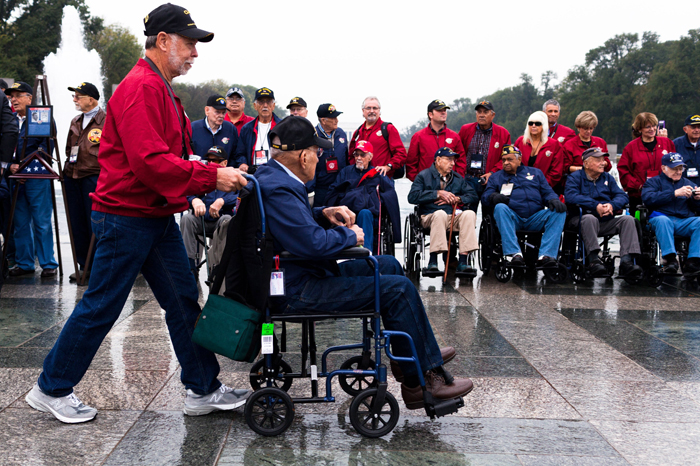Benefits for veterans need to be timely
World War II veterans and supporters pose at the World War II Memorial in D.C. on Oct. 30.
November 1, 2013
Citizens in the United States enter the military expecting to see combat in foreign countries, but too often, the hardest battles veterans face come after combat.
With so many men and women in military service risking life, limb and mental wellbeing in the name of freedom, veterans should not have to spend another day fighting to get their benefits or the help they need once returning home. Not at the national level, and not at WSU.
The statistics are harsh. The link between members of the military and post-traumatic stress disorder (PTSD) is nothing new, yet up to 20 percent of veterans of the Iraq and Afghanistan wars suffer from the disorder, according to the U.S. Department of Veteran’s Affairs (VA). The high-risk, high-mortality atmosphere of warfare is the birthing ground for many of the factors that lead to PTSD.
The combination of trauma, injury, threatening environment, and witnessing the death of a friend or fellow service member makes for a potent PTSD cocktail. It’s impossible to take the horror out of war, but as a country, the United States can take additional steps to improve the quality of life for veterans and members of the military.
Veterans are at risk for more than just PTSD. Many veterans face the danger of entering a dangerous cycle that leads to depression, substance abuse and suicide, according to The Huffington Post. In addition to veterans diagnosed with mental disorders, many experience short-term memory loss, headaches, insomnia, anger, and numbness in varying degrees of intensity.
Active-duty members and veterans alike face these challenges. Unfortunately, not all of them prevail. Between 2001 and 2012, more than 2,500 active-duty military members committed suicide, according to the same Huffington Post article. The suicide rate for all U.S. veterans is estimated at more than 500 per month, while the national veteran’s suicide crisis line operated by the VA gets approximately 17,000 calls a day.
The dangers of military service don’t begin or end with mental health issues. IEDs and weapons do just as much damage to veterans. Veterans who fought in the Iraq and Afghanistan wars are seeking disability benefits at record numbers.
In fact, 45 percent of the new generation of veterans seeks compensation for injuries sustained during active duty, according to The Huffington Post. Advances in body armor and battlefield care mean that more military members are able survive historically fatal wounds, leaving higher percentages of veterans to face life-changing physical injuries.
The majority of the United States populace is aware of the physical sacrifice by military members. However, the lasting effects of combat on many members of the military are incredibly personal. Statistics represent the scope of the problem, but the severity of issues faced by veterans and active-duty military personnel is more complex.
Even with the problems facing veterans, many have to wait for their benefits due to the high number of claims, according to The New York Times. Veterans have to adapt from the loud noise of gunfire to the silence of waiting for a phone call from the VA and the frustration of filling out endless paperwork. This legal, document-filled nightmare is referred to as ‘the backlog,’ a bottomless void of mishandled documents and mistakes. As a result, veterans can wait for years to receive benefits they need right away.
More than 900,000 veterans are currently waiting for benefits, according to NPR. That number is estimated to surpass one million within the year.
As the last university in Washington to do so, WSU established a temporary student veteran’s center in the Holland Library, according to a former Daily Evergreen article. The center is expected to open in January 2014.
Decisions at the university level take time, but WSU student veterans should keep WSU on track while looking for a permanent location of the student veteran’s center. If the wellbeing of students is one of WSU’s primary goals, the university should have a permanent location in mind or be pursuing funds to build a lasting veteran’s center before the end of finals week.
Many of the veterans who succumb to mental illness and depression do so because of a failure to access or attain VA benefits, according to The Huffington Post. The failure of WSU to establish a permanent veteran’s center could have serious repercussions for student veterans, which is why the establishment of the temporary veteran’s center is only the first step in the right direction.
If WSU was able to rebuild Martin Stadium into the Pantheon of Pullman, it should be no trouble to build a future for WSU veterans.
-Corrine Harris is a senior animal science major from Edmonds. She can be contacted at 335-2290 or by [email protected]. The opinions expressed in this column are not necessarily those of the staff of The Daily Evergreen or those of Student Publications.









